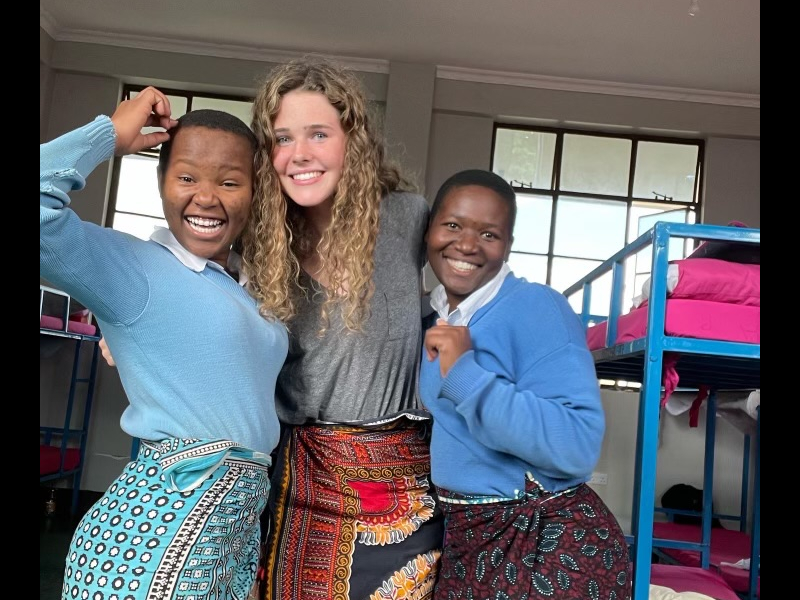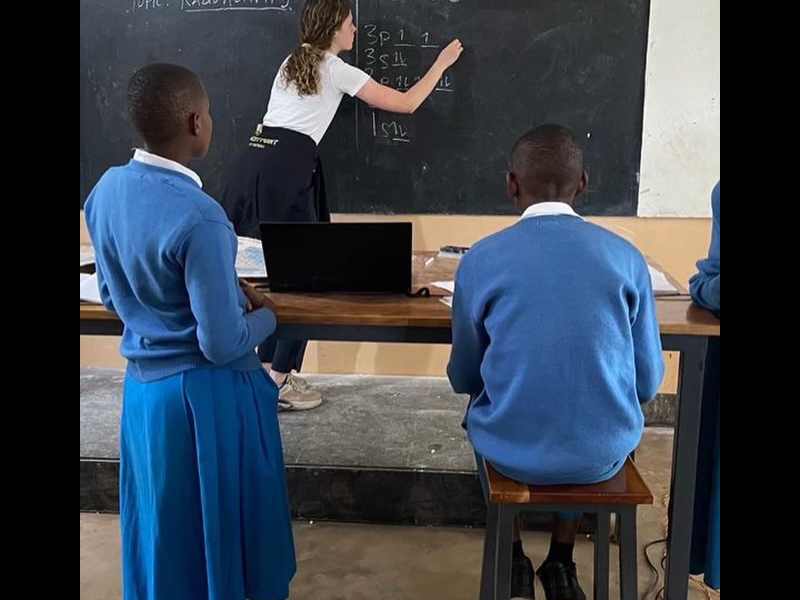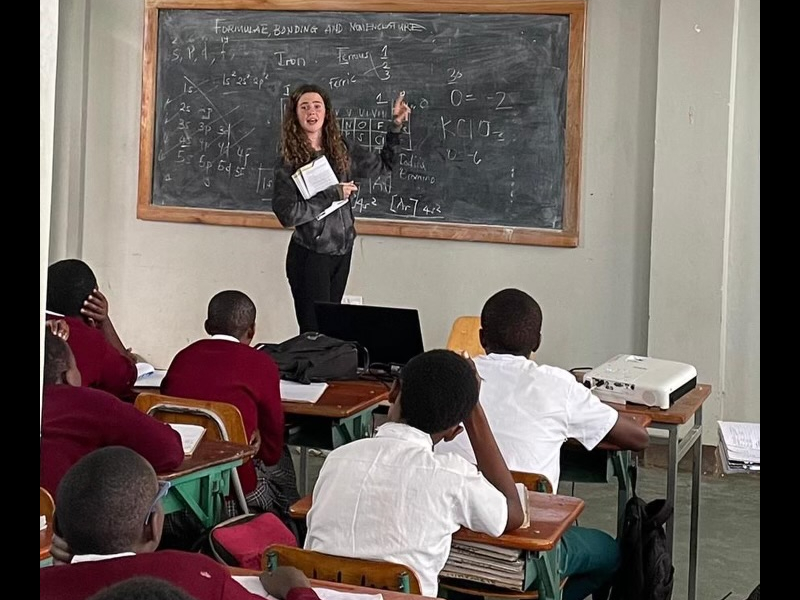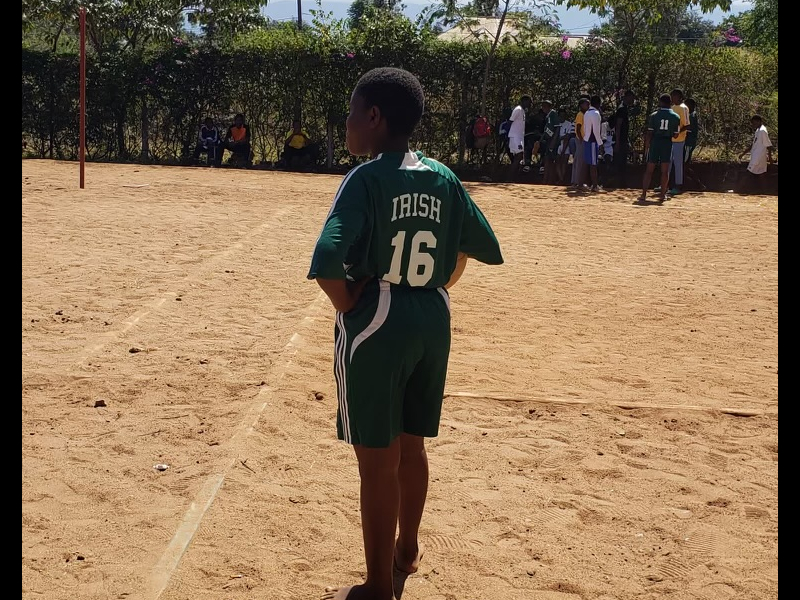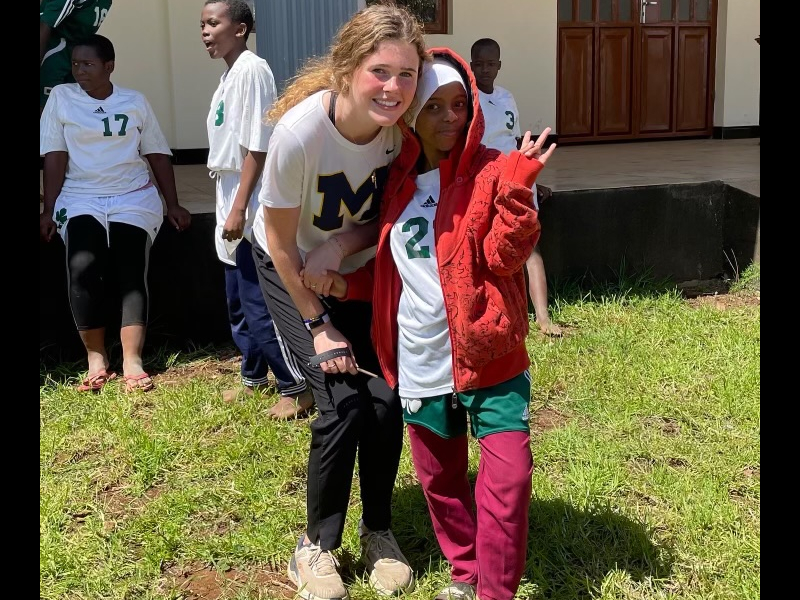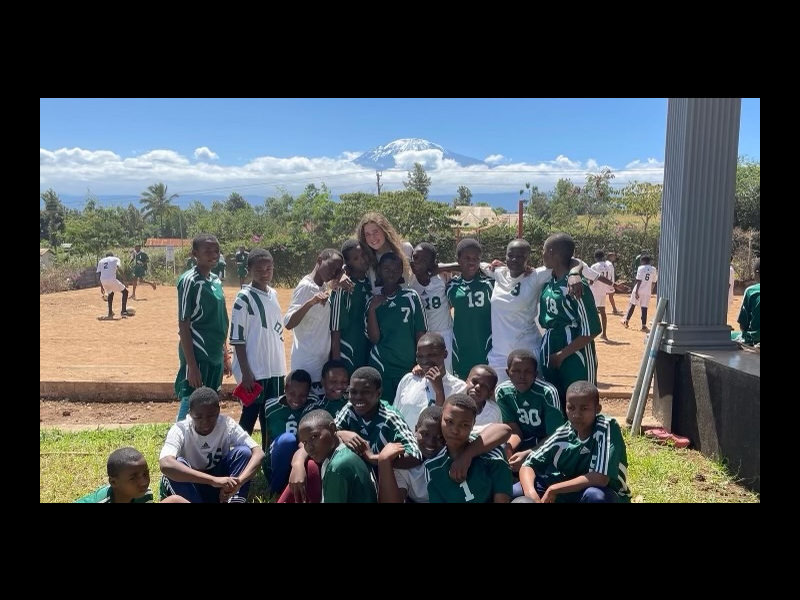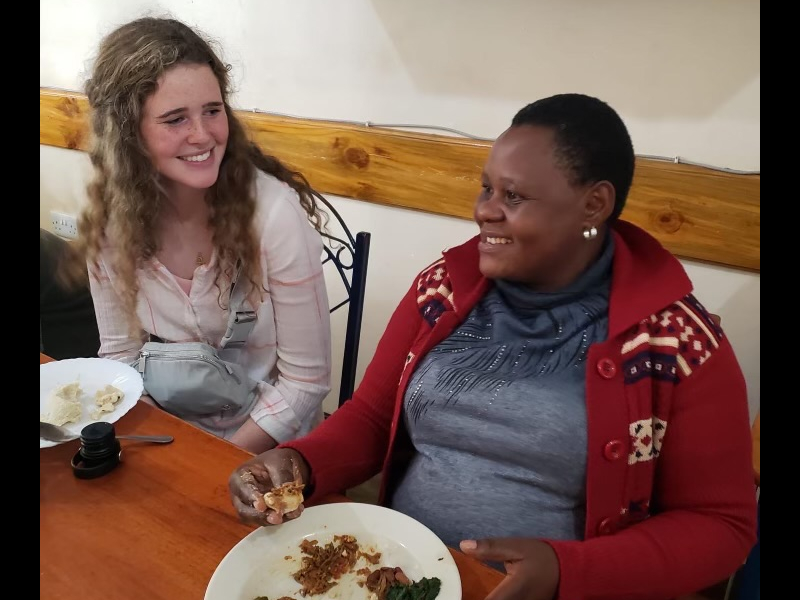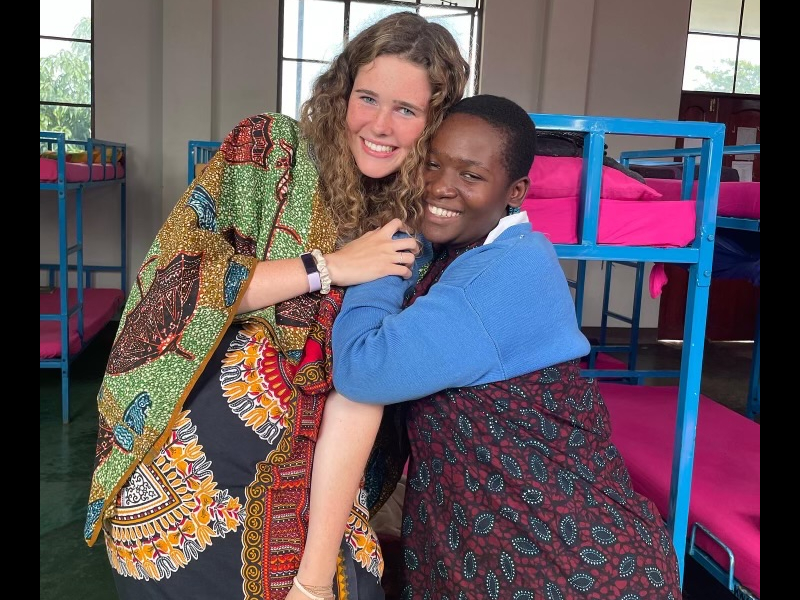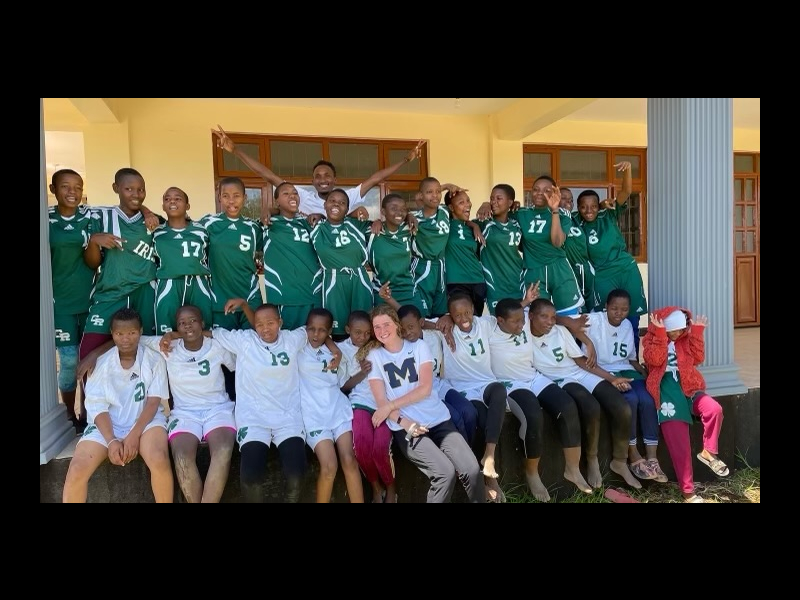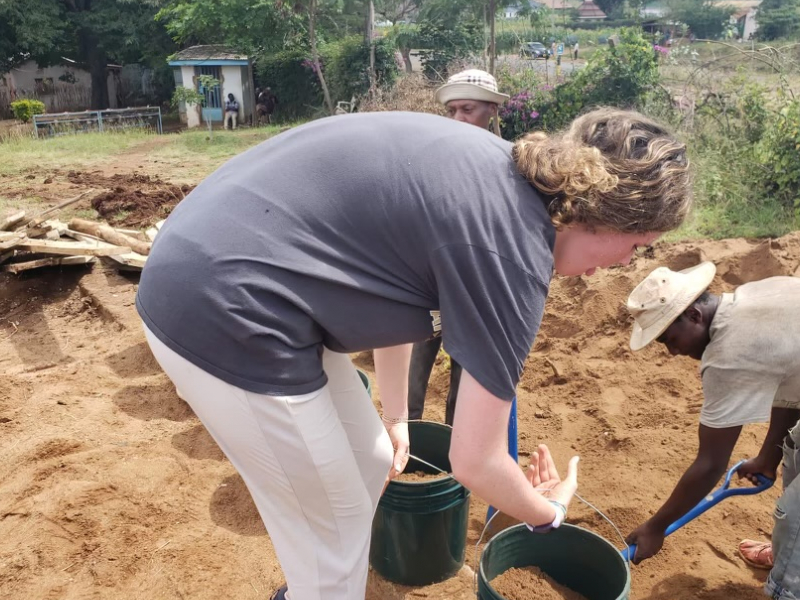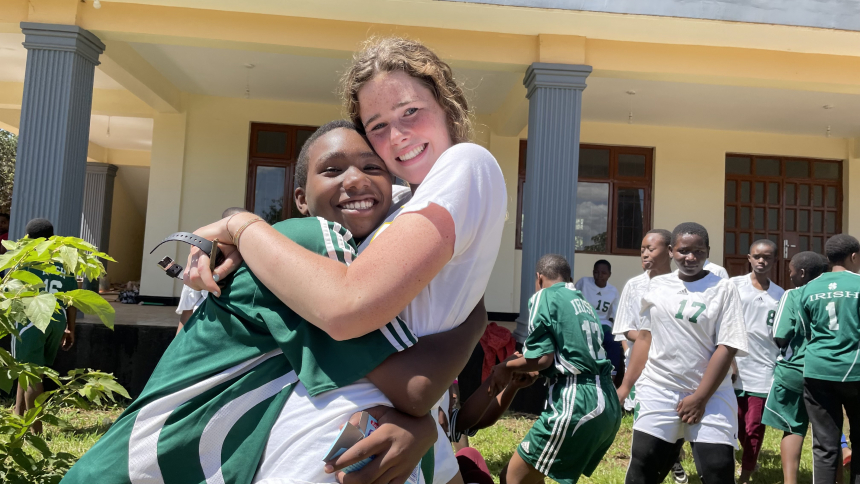
If you visit the website of Kilimahewa Modern Secondary School in Moshi, Tanzania, you’ll see pictures of the school’s athletic teams, writes Arwen Mosher.
A few of the students grin in the pictures, and the rest look serious, but they’re all dressed neatly in green and white. Along with numbers, the jerseys read “Irish” in block letters. Years ago, many of Ann Arbor’s Father Gabriel Richard (FGR) High School alumni competed in these exact sports uniforms. Now, Tanzanian students wear them proudly.
How did the uniforms make their way from FGR’s storage rooms into the hands of some of Tanzania’s poorest children? That’s the work of Daley Fitzpatrick, pictured, a 2022 FGR graduate and current University of Michigan student who has a zeal for helping the underprivileged, and big plans to let God work through her.
Fitzpatrick brought her passion for service into high school with her. During her eighth-grade year at St. Francis of Assisi Catholic School, a visitor from the Peace Corps sparked her interest. Pre-pandemic, she managed to go on service trips at the ages of 14 and 15: a general service trip to Costa Rica in 2018, and a global health mission to the Dominican Republic in 2019. On the latter trip, Fitzpatrick worked at pop-up clinics, which helped her realize she’d like to focus her eventual work in health care.
In 2020 and 2021, the pandemic made mission work difficult, but in the summer of 2022, Fitzpatrick tried to make up for lost time. The previous Thanksgiving, she’d connected with a relative, Misty Eddy, whose friend “Mama Grace” had founded a school for underprivileged children in Tanzania. Through Misty, Fitzpatrick began communicating with Mama Grace and planned for a service trip with multiple projects, serving the Kilimahewa School in Moshi.
Fitzpatrick raised funds and provided the labor necessary to complete two projects for the school. Her work contributed to food sustainability for the school, which struggles constantly to provide enough food for its students. The funds also purchased seeds for a horticulture project, with the students doing the planting and other work to provide grain and produce for the school.
The most ambitious of Fitzpatrick’s projects, and one to which this former FGR student athlete brought a particular passion, was a netball court for the school. Before they had the court, girls at Kilimahewa were excluded from school sports, denying them important opportunities for exercise and competition. The netball court allows them to play volleyball and other sports, and during her trip, Fitzpatrick was able to be present for its completion. “I got to help move buckets of sand for the court,” she says. “It was hard work, but very rewarding. And students and teachers helped whenever they could, with so much joy!”
One piece that made them especially happy, Fitzpatrick says, was a part of the project that she hadn’t even planned. During a conversation with FGR’s athletic director, Mickey Redmond, before her trip, she told him about her plan, and he offered her a large collection of retired sports uniforms from the school’s storage. Fitzpatrick took them along on her trip for the Kilimahewa students, and “you would not believe how excited they were,” she says. “These old uniforms that no one at FGR would even want to wear, are prized possessions to these kids.” She describes the students carefully hand washing the shorts and jerseys and hanging them to dry. Years, maybe even decades, after their initial purchase, FGR’s sports uniforms are getting the best treatment of their lives!
Fitzpatrick accomplished a lot in one trip, but she’s just getting started. She speaks articulately and openly about her vision for a life of service. During her junior year at FGR, she came across a quotation from St. Teresa of Calcutta about the importance of “loving until it hurts.” “That’s the question I ask myself over and over,” Fitzpatrick says sincerely. “Am I loving until it hurts yet? And if not, how do I get there?”
Now entering her sophomore year at the University of Michigan with a double major in global health and Spanish, Fitzpatrick plans to attend medical school after undergrad. First, though, she’d like to take a gap year to attend a program on theology and medicine that she hopes will help her become a better Christian doctor. “I miss my theology classes from FGR,” she says. She is also currently training to become an emergency medical technician, hoping that doing EMT work now will help equip her for future mission work.
A year after her work at Kilimahewa, Fitzpatrick is still in close contact with the community. She says that being there changed her life; she was struck by the people’s generosity in their poverty, even down to their greetings.
“They say, ‘Good, thank God,’ when you ask them how they are doing. They have so much gratitude,” she recalls.
Fitzpatrick noticed how the people’s physical dependence on God causes them to live out a spiritual dependence as well, and her own resultant self-examination has led to a deliberate focus. “I’m trying to unleash who I’m meant to be by increasing my own dependence on God.”
FGR’s old uniforms couldn’t have found a better home than on the backs of the students at Kilimahewa School, students who witness to God’s goodness through joy in their poverty. And FGR has its own witness in the life of Daley Fitzpatrick, whose dedication to serving the most marginalized of God’s children does great credit to the high school that helped form her and send her into adulthood.

